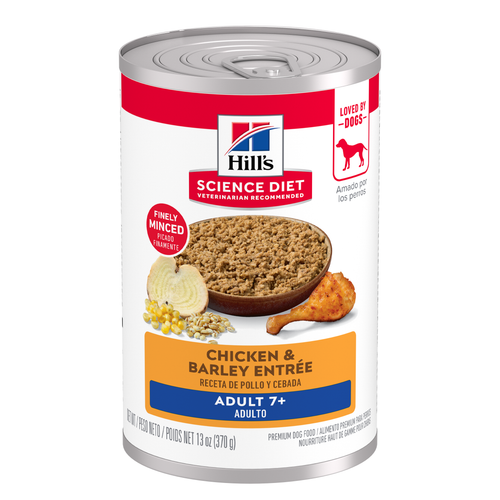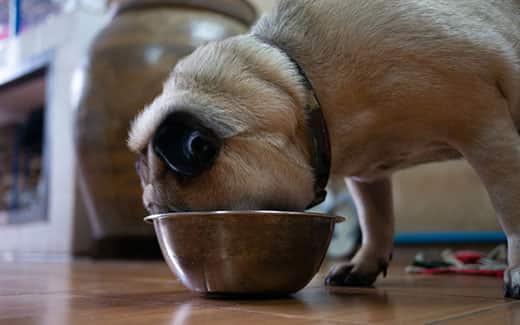
-
Find the right food for your petTake this quiz to see which food may be the best for your furry friend.Find the right food for your petTake this quiz to see which food may be the best for your furry friend.Featured products
 Adult Large Breed Chicken & Barley Recipe Dog Food
Adult Large Breed Chicken & Barley Recipe Dog FoodSupports healthy joints, lean muscle, and beautiful coat for large breed dogs
Shop Now Adult Chicken & Barley Recipe Dog Food
Adult Chicken & Barley Recipe Dog FoodSupports lean muscle and beautiful coat for adult dogs
Shop Now Adult 7+ Chicken & Barley Entrée Dog Food
Adult 7+ Chicken & Barley Entrée Dog FoodChicken & Barley Entrée in a delicious loaf with precisely balanced nutrition to support mobility and muscle mass for older dogs
Shop NowFeatured products Adult 7+ Indoor Chicken Recipe Cat Food
Adult 7+ Indoor Chicken Recipe Cat FoodSupports energy level and beautiful fur in mature indoor cats
Shop Now Adult Turkey & Liver Entrée Cat Food
Adult Turkey & Liver Entrée Cat FoodPrecisely balanced nutrition with the delicious taste of minced turkey & liver to help fuel the energy needs of cats during the prime of their life
Shop Now Senior Vitality Adult 7+ Tuna & Vegetables Stew
Senior Vitality Adult 7+ Tuna & Vegetables StewImproves Everyday Ability to Get Up & Go
Shop Now -
Dog
- Dog Tips & Articles
-
Health Category
- Weight
- Food & Environmental Sensitivities
- Urinary
- Digestive
- Joint
- Kidney
-
Life Stage
- Puppy Nutrition
- Adult Nutrition
- Senior Nutrition
Cat- Cat Tips & Articles
-
Health Category
- Weight
- Skin & Food Sensitivities
- Urinary
- Digestive
- Kidney
-
Life Stage
- Kitten Nutrition
- Adult Nutrition
Featured articles How to Properly Mix Wet & Dry Pet Foods
How to Properly Mix Wet & Dry Pet FoodsAn Orange cat eating from a bowl filled with mixed food
Read More The Science Behind Our Love for Pets
The Science Behind Our Love for PetsLearn the scientific reasons why we have such strong connections with our pets, and what science says about the love between humans and our furry friends.
Read More What Is Littermate Syndrome? Pet Adoption Guide
What Is Littermate Syndrome? Pet Adoption GuideLearn more about littermate syndrome in dogs and cats and how to successfully navigate adoption and early socialization processes.
Read More -


There are a million jokes that can be made about dog farting, but if you have a pet who is an excessive farter, the smell or sound might be wreaking havoc on your personal life. Plus, in some instances, the answer behind what makes dogs fart such foul-smelling gas could be that their health needs attention.
Or, quite simply, your dog might just be a super-farter who doesn't mind stinking you out. Hey, we all have our special talents; this just might be theirs.
If you've ever noticed that your dog farts a lot, or have had to deal with the embarrassment of it happening when you have guests over, then this guide is for you. Here's how you can determine what may be causing the noxious smells and whether or not the gas warrants a prompt visit to the veterinarian.
What Makes Dogs Fart?
There are many reasons why your dog may be extra flatulent. Some common reasons include changing their food, gastrointestinal illness and nutritional disturbances, such as a food allergy.
Another cause can be the type, quality and quantity of ingredients in your dog's food as they influence the amount of gas formed in the intestine. When bacteria in the colon ferment fiber or poorly digested proteins and carbohydrates, gas is produced. Pet food containing oligosaccharides (found in ingredients such as soybeans, beans, chic peas and lentils) tend to produce large amounts of gas in the intestine since dogs lack the digestive enzymes needed to breakdown these complex carbohydrates.
However, there are other, less common, reasons your dog might be stink-bombing your family. Does your pooch eat too fast? The American Kennel Club (AKC) reports, "It is widely believed that aerophagia, or increased swallowing of air, can lead to gas in dogs. Greedy eaters that wolf down their food and brachycephalic breeds are at an increased risk of swallowing more air than normal, which can lead to gas down the line, so to speak."

But, Seriously. My Dog Farts A LOT.
Passing gas is as normal for dogs as it is for humans. However, it's important to pay attention if you're noticing a significant increase in your dog's flatulence.
What you may view as "too many farts" could be an indication that your pet is experiencing gastrointestinal issues that need resolving. Additionally, farting could be a sign of intestinal parasites and problems with the pancreas, says the AKC.
Any major change in a pet, even if it seems as silly as farting, warrants a trip to the veterinarian to ensure they aren't experiencing a serious problem. If gas is accompanied by poor appetite, diarrhea, vomiting and behavior changes, it's definitely a good idea to give your vet a call.


Tasty Tips
How to Stop the Farting
If you think your dog farts a lot and are wondering how to reduce it to a more appropriate amount — you're in luck. If you and your veterinarian are able to identify the cause of the excess gas, you might be able to reduce some of the farting. For example, if you feed your dog slices of cheese as a treat, but your veterinarian determines your pet is sensitive to dairy, simply eliminating it from their meal plan can drastically decrease their flatulence.
However, just as you can't control another human's gas passing, you can't completely control your pet's either; though, what they eat could offer your nose a little relief. Dog foods that contain high levels of protein or poorly digested proteins often produce more odorous farts. Ingredients such as broccoli, cabbage, cauliflower and Brussels sprouts can also be fermented and produce sulfur containing gases that lead to smelly farts.
Importance of Nutrition and Its Role in a Dog's Flatulence
Speaking of what your dog eats, their every day nutrition plays a huge role in their digestive health that, in turn, impacts how much gas they might be passing. Certain dog foods that contain high levels of protein or poorly digested protein often produce more odorous farts. Intestinal bacteria can ferment undigested proteins and produce sulfur containing gases. Ingredients such as onions, nuts, broccoli, cabbage, cauliflower and Brussels sprouts can also be fermented and produce sulfur containing gases.
A properly balanced dog food with the right nutrients can help promote healthier digestion. Be sure to ask your veterinarian for some recommendations on a healthy dog food. Additionally, for dogs that have more sensitive stomachs or other diseases that cause poor digestion or absorption of nutrients that are often associated with bloating and flatulence, there are dog foods specially formulated to support your dog's GI tract health. Be sure to ask your veterinarian if one of these therapeutic pet foods is a good option.
Now that you know what makes dogs fart, you can hopefully put an end to — at least some of — the stink bombs in your house! Take a closer look at your pup's food and see if there is anything that might be putting their digestive system out of whack. And remember, a quick visit to the vet can always help you determine how to proceed in the best interest of your pet's health.


Erin Ollila believes in the power of words and how a message can inform—and even transform—its intended audience. Her writing can be found all over the internet and in print, and includes interviews, ghostwriting, blog posts, and creative nonfiction. Erin is a geek for SEO and all things social media. She graduated from Fairfield University with an M.F.A. in Creative Writing. Reach out to her on Twitter @ReinventingErin or learn more about her at http://erinollila.com.
Related products

Supports lean muscle and beautiful coat for adult dogs

Chicken & Barley Entrée in a delicious loaf with precisely balanced nutrition to support mobility and muscle mass for older dogs

Supports healthy joints, lean muscle, and beautiful coat for large breed dogs

Chicken & Beef Entrée in a delicious loaf with complete & balanced nutrition to help keep adult dogs active and healthy
Related articles

Your dog's coat and skin are a big part of your dog's overall health. Ensure you keep your dog's coat healthy, by following these simple tips.

Learn how to help keep your dog's immune system in tip-top shape, including nutritional immune system support for dogs and other strategies.

Discover how the field of dog science is giving us more and more insights into the inner workings of our furry best friends.

Wondering where can I buy a dog? Consider adoption and explore the pros and cons of adopting a dog from a breeder versus an animal shelter.

Put your dog on a diet without them knowing
Our low calorie formula helps you control your dog's weight. It's packed with high-quality protein for building lean muscles, and made with purposeful ingredients for a flavorful, nutritious meal. Clinically proven antioxidants, Vitamin C+E, help promote a healthy immune system.
Put your dog on a diet without them knowing
Our low calorie formula helps you control your dog's weight. It's packed with high-quality protein for building lean muscles, and made with purposeful ingredients for a flavorful, nutritious meal. Clinically proven antioxidants, Vitamin C+E, help promote a healthy immune system.

